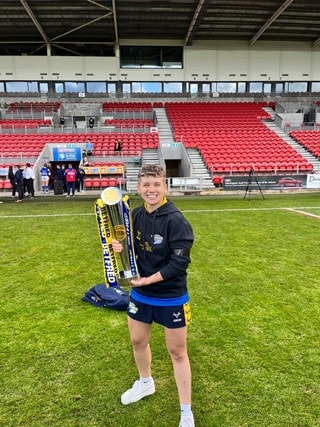Leeds Beckett University - City Campus,
Woodhouse Lane,
LS1 3HE
10 questions with SPEX graduate and Head of Nutrition at Tottenham Hotspur
Alumni Spotlight | Emma Tester

We did a quick 10 question interview with Emma Tester, Sport and Exercise Science graduate from Leeds Beckett University and now Head of Nutrition at Tottenham Hotspur Football Club.
1. Why did you choose to study BSc (Hons) Sport and Exercise Science?
I really enjoyed PE and biology at school, and the BSc (Hons) Sport and Exercise Science degree was a great combination of modules and topics I was keen to study and learn more about.
2. What attracted you to study at Leeds Beckett University?
Leeds Beckett University had a great reputation for sport, and the course itself was ranked very highly. I attended open days at other institutions, but the Headingley Campus felt like a great place to come and study.
3. Did you know what you wanted to do for a career before coming to University?
No! I’ve always just gone for the things I enjoyed most, but the more I studied sport science and nutrition, the more I wanted to explore and understand.
4. Would you say there are lots of career opportunities for Sport and Exercise Science graduates?
Yes, there are lots of opportunities, many of my student colleagues went straight into a career path, some went onto study other disciplines and some progressed onto further study in sports related courses.
5. What skills did you learn on your Sport and Exercise Science degree which helped prepare you for a career as a nutritionist?
Studying a broad range of sports science disciplines gave me a really solid platform of knowledge to progress onto further study. I think my breadth of knowledge still stands me well, even to this day. The range of teaching and assessments pushed me into developing a critical mindset which is vital in my current role.
6. Why did you choose to go onto study an MSc in Sport and Exercise Nutrition?
Again, I’ve always done what I enjoy, when I got the opportunity to study nutrition in the third year, I found I really enjoyed it so wanted to pursue that further, I still didn’t know I’d become a sports nutritionist at that stage! However, when I got onto the MSc Sport & Exercise Nutrition course, I quickly realised it was something I wanted to do in the future. The internship within the Sport Performance Centre gave me my first real experience in the field and I couldn’t wait to do more.
7. Can you tell us about what led you to completing a PhD?
When I’d finished the MSc, I spent a couple of years working as a practitioner in various sport settings and on a few different research projects at the university. I started to further develop that critical mindset and found there were performance questions from my practice that I wanted to explore further from a research perspective. It was then I started to draw together research ideas and put together a programme of study.
8. You’ve held nutritionist roles at Leicester City Football Club and Munster Rugby in Ireland, and you’re now working as the Head of Nutrition at Tottenham Hotspur Football Club. Can you tell us what your job as a nutritionist entails?
The job of a Performance Nutritionist is to ensure athletes are achieving optimal nutrition status for training and competition. This means we focus on how we can manipulate the type, timing and quantity of foods and fluids so that athletes are ready to perform.
9. What do you enjoy most about being a nutritionist?
Of course I love it when I see athletes on a podium or with trophies in their hand, but some of my proudest achievements have been working with athletes undergoing rehab after injury and seeing them play their first match after months out of competition. I also love the lightbulb moments, when there’s a sudden look of understanding on an athlete’s face, and you know the message you’re trying to communicate has hit home.
10. What advice would you give a prospective Sport and Exercise Science student who may also be interested in working in nutrition?
It can be a really challenging career to break into and hard work at times, but just always make sure you pursue what you enjoy the most. It’s such a rewarding job to know you’re playing a part in an athlete’s success!














